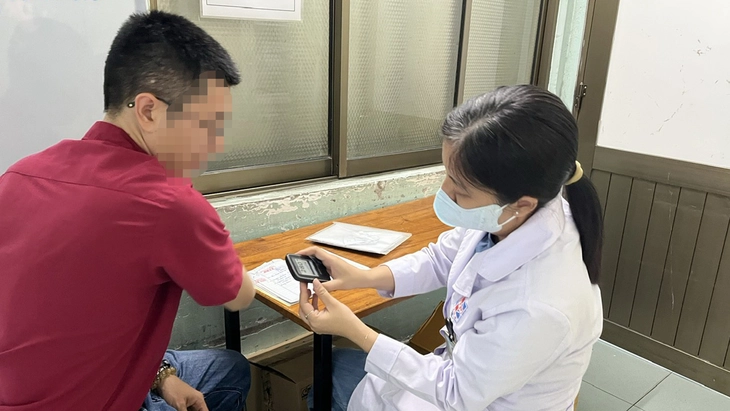
Doctor checks patient's blood glucose meter - Photo: THUY DUONG
"Many people with type 1 diabetes are susceptible to many complications, and many even fall into depression... However, as long as the patient complies with treatment, they will integrate well into life.
There are many famous athletes who have achieved high achievements in sports and are people with type 1 diabetes," Dr. Tran Quang Khanh - head of the endocrinology department at Nguyen Tri Phuong Hospital, Ho Chi Minh City, explained.
Injecting drugs 4 times a day but still participating in 4 races
Mr. Ho Van Quy, 35 years old, living in District 8, Ho Chi Minh City, was diagnosed with type 1 diabetes, acute form by doctors at Nguyen Tri Phuong Hospital.
At first, when the doctor told him that his illness required him to inject insulin four times a day, Mr. Quy was shocked to see that his life was suddenly tied to insulin injections.
He was very sad but thinking of his responsibility as a husband and father, he strictly followed the diet and injection regimen that the doctor had advised.
"I have been fitted with a blood glucose monitor to monitor my blood sugar. From the information from the monitor, I adjust my insulin injections accurately. Every day I inject insulin 3 times 5 minutes before meals.
For all three injections, I adjusted the insulin dose according to my food intake. At 9pm, I injected again with the exact amount of insulin as prescribed by the doctor," Mr. Quy recounted his daily routine.
But in the past 3 years, despite having to take 4 injections every day, Mr. Quy still runs regularly and participates in 4 races, including a 42km race. He has been praised by his treating doctors as a patient who adheres to treatment well and has a good life.
Doctor Nguyen Thi Diem Ngoc, endocrinology department, Nguyen Tri Phuong Hospital, said that when informing a patient that they have type 1 diabetes, the doctor must instruct the patient on how to inject insulin, how to eat, exercise, etc.
Patients who comply with treatment like Mr. Quy experience life like normal people.
But very few patients are like that. In fact, many patients get injections just for the sake of it, eat freely, and are lazy to exercise, so they have complications such as numbness in hands and feet, blurred vision, etc. Many patients are also discouraged, depressed, and suffer from depression over time.
Hyperacute type 1 diabetes
Doctor Khanh said that when having classic type 1 diabetes, the patient will have four-many syndrome. That is, being very thin, very thirsty, eating a lot and losing a lot of weight. In the acute stage, the patient does not have four-many syndrome but suddenly falls into a coma.
When informed that they have type 1 diabetes, most patients are surprised, many patients feel like they are receiving a... death sentence.
In treating patients with type 1 diabetes, Dr. Quang Khanh said that at the age from adolescence to young woman or adolescence to young man (usually from 10-15 years old), children have a very complicated psychological stage. It is very difficult for children to accept. Children often let their blood sugar go very high, and then go low. That is why many children fall into a coma and have to be hospitalized.
Common complications of type 1 diabetes are retinopathy, children will have reduced vision, blindness, kidney failure, and in the long term will need dialysis or kidney transplant.
People with type 2 diabetes usually get the disease between the ages of 40 and 50, so it is easier to control. Type 1 diabetes is more common in people under 35, even children as young as 4 years old have the disease.
Should proactively monitor health
To date, there is no way to prevent type 1 diabetes. Dr. Quang Khanh recommends proactively monitoring health to promptly detect abnormalities that could indicate the disease and quickly go for examination and screening.
Source: https://tuoitre.vn/dai-thao-duong-type-1-chua-han-la-tham-hoa-20250415223005443.htm


![[Photo] Opening of the 4th Summit of the Partnership for Green Growth and the Global Goals](https://vstatic.vietnam.vn/vietnam/resource/IMAGE/2025/4/16/488550ff07ce4cd9b68a2a9572a6e035)
![[Photo] President Luong Cuong meets 100 typical examples of the Deeds of Kindness Program](https://vstatic.vietnam.vn/vietnam/resource/IMAGE/2025/4/16/ce8300edfa7e4afbb3d6da8f2172d580)
![[Photo] Many practical activities of the 9th Vietnam-China border defense friendship exchange](https://vstatic.vietnam.vn/vietnam/resource/IMAGE/2025/4/16/3016ed3ef51049219574230056ddb741)
![[Photo] President Luong Cuong receives Ethiopian Prime Minister Abiy Ahmed Ali](https://vstatic.vietnam.vn/vietnam/resource/IMAGE/2025/4/16/504685cac833417284c88a786739119c)
![[Photo] Opening of the Exhibition on Green Growth](https://vstatic.vietnam.vn/vietnam/resource/IMAGE/2025/4/16/253372a4bb6e4138b6f308bc5c63fd51)
![[Photo] National Assembly Chairman Tran Thanh Man meets with Ethiopian Prime Minister Abiy Ahmed Ali](https://vstatic.vietnam.vn/vietnam/resource/IMAGE/2025/4/16/c196dbc1755d46e4ae7b506c5c15be55)





















































































Comment (0)